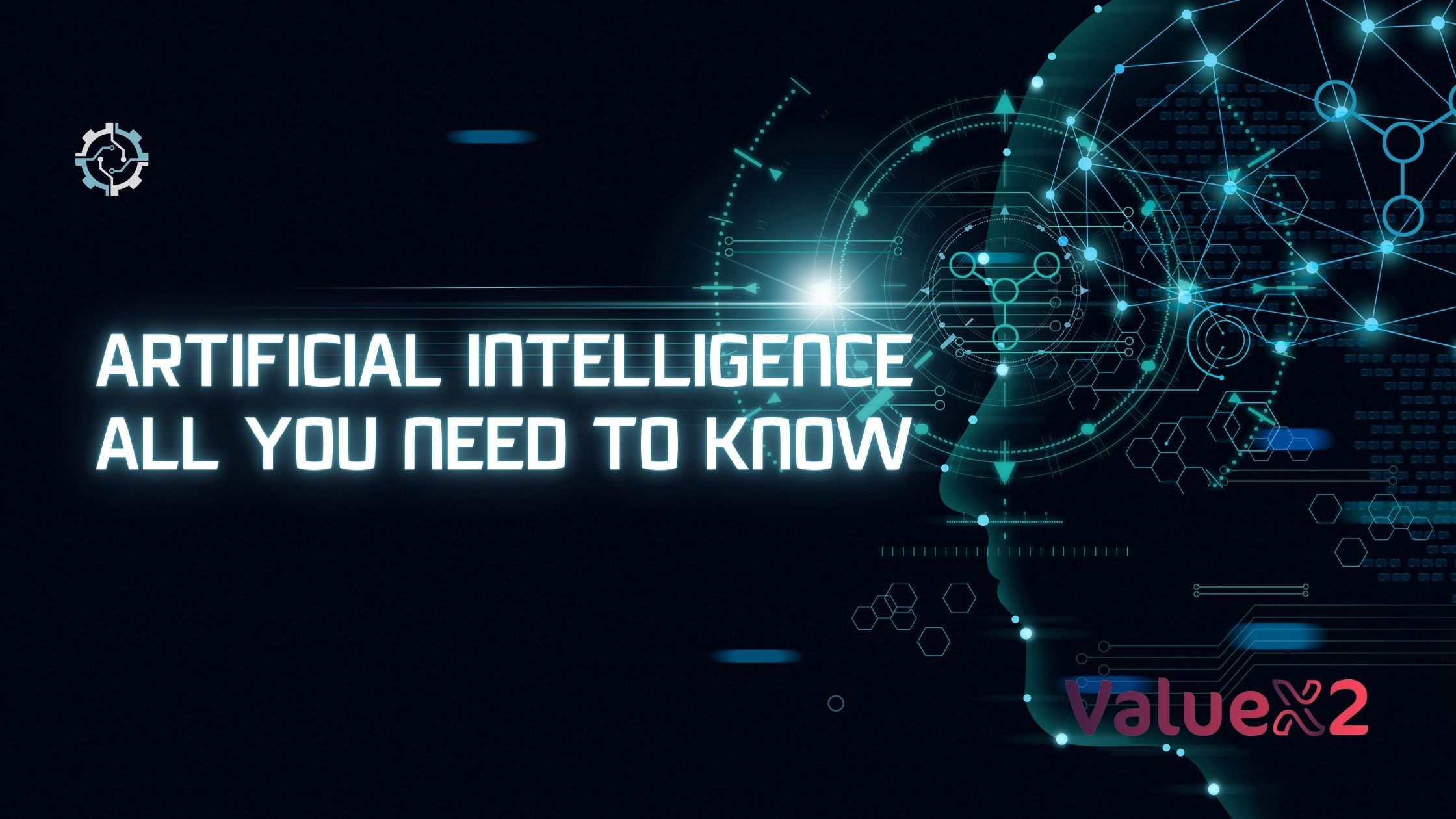Here’s everything you need to know about Artificial Intelligence. From how AI works to the future of AI, we have discussed it all.
Introduction
Artificial intelligence (AI) is no longer a complex future innovation but now, a technology that is changing industries, economies and society, AI is an extensive branch of technologies of Machine Learning, Natural Language Processing, and Robotics that mimic human intelligence to perform tasks more efficiently and accurately than human, it is significantly used for deep learning and to minimize or say eradicate fraudulence as well as automated trading.
In education, the uses of artificial intelligence range from developing and providing unique learning aptitudes to students and handling tedious work. Protection of fairness, accountability, and security in deploying AI is central to the creation of value-adding applications for the strength of society.
Learn more about Artificial Intelligence in this blog and also explore what’s new in the AI industry currently, the next eras of AI, ethical considerations and challenges, and FAQs related to AI.
Next Eras of the AI
The future of artificial intelligence holds even more for AI enhancement or capturing AI as the specified new disturbances are expected to incorporate increased autonomy and intelligence in human life; the general AI or strong AI is the focal point of this future where this AI is expected to do any intellectual task that is possibly achievable by any human being and would revolutionize industries even further by making these machines learn context, be creative and take decisions independently. Moreover, it is further expected to bring revolutionary interventions in the fields of emerging technology advancements in biotechnology, environment, and smart city solutions for a way forward for the betterment of mankind.
From the discussion above it is clear that some issues need to be solved as AI advances, for example, issues like; Bias, privacy and job displacement, these are some key items that we believe people must work on to ensure that the development of AI will help the society to grow. ValueX2 has purposed to equip these professionals for this future by providing training that not only focuses on the kind of technology that is Artificial Intelligence but also the ethical and social consequences.
AI in the 21st Century
The versatility of AI allows it to be applied across various sectors to enhance efficiency and enable new capabilities:
- Healthcare
AI algorithms assist in diagnosing diseases, personalizing treatment plans, and performing robotic surgeries. For example, AI can analyze medical images more accurately and quickly than human radiologists.
- Finance
AI is instrumental in fraud detection, automated trading, and providing personalized financial advice. Machine learning models predict market trends and assess credit risks.
- Retail
Enhances customer experience through personalized recommendations, efficient inventory management, and AI-driven customer service chatbots.
- Transportation
AI enables autonomous vehicles, optimizes routing, and predicts maintenance needs to improve safety and efficiency.
- Education
AI-powered tools deliver personalized learning experiences, automate administrative tasks, and support intelligent tutoring systems.
Ethical Considerations and Challenges
The rapid advancement of AI brings forth several ethical and practical challenges:
- Bias and Fairness
AI systems must be designed to avoid biases, ensuring fair outcomes for all users. Transparency in AI processes is crucial.
- Privacy Concerns
The extensive use of data in AI raises significant privacy and security issues. Regulatory frameworks are needed to protect individual privacy.
- Job Displacement:
AI-driven automation may displace some jobs, necessitating robust policies for worker retraining and reskilling.
How AI makes Agile learning easy
AI has different effects on Agile learning by improving Scrum, (ICAgile), and SAFe techniques. Thus, AI in Scrum is used in task attribution and enhances the management of sprints. In the case of ICAgile, it incorporates personalization and fluidity for the adapted content for the learner. In this environment of SAFe, AI synchronizes numerous teams with performance information and decides with facts. The use of AI in Agile practices helps in improving certain things – Here are a few of the ways AI is having a transformative impact on Agile learning.
- Enhanced Collaboration and Communication
Automating the workflow improves how Agile teams interact with each other by improving the communication between them. It also means that AI can diagnose people’s interactions and recognize contradictions in team relations by proposing appropriate solutions.
- Predictive Analytics for Project Management
With the help of real Historical data and current project parameters, artificial intelligence can assess potential threats, estimate the time necessary to complete a project and provide an optimal distribution of resources.
- Real-Time Feedback and Continuous Improvement
Advanced analytical capability and natural language processing can give real-time performance feedback which is not possible in the case of humans, for instance, AI can review the efficiency and reliability of coded programs, and identify and even suggest the fix for errors on the go.
- Advanced Data-Driven Insights
Agile teams rely on data analysis by AI to derive better solutions to particular issues that are faced. Various issues can be solved by leveraging data analysis provided by AI such as strategic planning and better ways of coming up with decisions among other things can be enhanced.
- Automating Repetitive Tasks
AI-powered automation tools can handle mundane activities such as data entry, testing, and reporting
- Facilitating Remote and Distributed Teams
It is in this aspect that the use of AI in the platforms allows for the effective coordination of communication over projects, and effective tracking of resources from different locations proactively keeping Agile practices intact.
- Personalized Learning Pathways
The AI technology in it guarantees the applicability of content and resources concerning every learner, which can help Agile practitioners work through the material at their own pace and most importantly, at the areas of weakness.
Some Frequently Asked Questions on Artificial Intelligence
- What is Artificial Intelligence in simple words?
AI or Artificial Intelligence is making computers perform actions that have otherwise needed human intelligence to be executed. This may comprise elements like the interpretation of language, identifying physical images, decision-making, and learning from occurrences. In simplified terms, artificial intelligence can be defined as how intelligent machines could be. - What is AI used for?
AI is used in several works such as voice recognition as embodied by Siri, Alexa and other digital assistants, recommendation engines such as Netflix and Amazon, disease diagnosis and precise treatment determination in the healthcare industry, self-driving vehicles, digital helpers in customer services, credit card fraud detection, images and speech recognition, gaming, language translation, and even in targeting customers by advertising and more. - What are the 4 types of AI technology?
There are four main types of Artificial Intelligence technology; these are Reactive Machines which are AI technologies that only respond to current situations and thus cannot experience or learn from the past, Limited Memory which are computing technologies that can learn and reason based on experiences of the past, the Theory of Mind, which are the highly developed, and hypothetical AI technologies that can understand the emotions of people and the beliefs they hold in a bid to communicate with them effectively.
- Who is the father of AI?
John McCarthy is stated to be the father of AI as he proposed the concept during a conference held at Dartmouth College in June 1956. The person was a computer scientist who invented the term Artificial Intelligence in 1956 and has made a considerable impact in the development of AI such as the Lisp compiler.
- What is the future of Artificial General Intelligence?
Artificial General Intelligence (AGI) encompasses smart machines that are capable of performing complex cognitive tasks across numerous domains and the subject of when this kind of Artificial Intelligence is expected to arrive is a matter of endless discussion. Most professionals are optimistic that AGI may cause changes in multiple sectors, implying the development of several innovations in technologies, medicine, etc. - What is the main concept of AI?
AI can be defined as the ability to create intelligent machines that are capable of performing tasks that a human being tends to accomplish. This beacons the capacity to acquire knowledge from experience, to interpret natural language, to perceive or identify regularities, to figure out problems, and to choose. AI is a set of processes in which targets are structured to mimic or replicate cognitive human functions to use them to perform tasks or make decisions automatically, expand capabilities where possible, and act where necessary.
- Which is better, AI or ML?
Al and ML are two distinct things and cannot be easily compared as one subsuming the other as they are used hand in hand for specific applications. Artificial Intelligence (AI) is the general concept which implies that machines can wisely perform tasks and has many approaches which include; rule-based systems, expert systems and neural networks. AI is a general branch of computer science that is based on the concept that machines can work and reason like humans do, while ML is a discipline of AI which is based on the idea that machines can learn from the data provided to them and can improve their performance without being programmed again.
- Are AI and Machine Learning good as a career?
Indeed, there does exist meaningful employment prospects within artificial intelligence and machine learning. As they stand, organizations across technology, healthcare, finance, automotive, and every other sector are in dire need of talents with deep knowledge in AI and ML. AI and ML offer some of the most brainsuine occupations with being an AI engineer and machine learning researcher, data scientist, AI ethician and policy advisor among the numerous career opportunities in the field.
- How does artificial intelligence benefit us?
AI helps in efficient functioning through task automation, by providing crucial data-driven decision-making capabilities, creating customer and consumer-oriented models with applications in almost every business area or field, optimization, and contributing to innovation in technology and health care and safety, security, and sustainability. - What is the difference between OpenAI and Generative AI?
OpenAI is a research company that aims at advancing friendly AI and making sure the AI is harmless to humanity as a whole. They are known for their contributions towards promoting AI and opening it to more uses. Generative AI on the other hand is a specific type of AI technology in which the technology is trained to create new content, for instance, text, images or music from a given set of data. - What is an example of a generative AI model?
The most well-known examples of a generative AI model can be referred to as OpenAI’s GPT or Generative Pre-trained Transformer families of models such as GPT-2, GPT-3 and more. These models can be trained to produce syntactically correct sentences and semantically correct texts that are relevant to the input they’re given.
Conclusion
Artificial Intelligence is quite an effective tool, which can become a le vain in growth in different fields and our day-to-day existence. Hence, as the advancement in AI progresses, it is crucial to know and differentiate what the technology is capable of, what it can be used for, and most importantly, the moral issues that accompany it. It is believed that investing in artificial intelligence ethically opens up possibilities and helps solve existential global issues.

Bhavna is an Agile Coach and Consultant with over a decade of experience in advisory, corporate finance, IT assurance, and operations at Big 4 and within the industry in the UK and India. She has recently been the CEO of a start-up where she implemented agile practices within HR, Marketing, and Product teams.
She is also a SAFe® Practice Consultant (SPC) and authorized instructor for ICAgile Agility in HR (ICP-AHR), Agility in Marketing (ICP-MKG), and Business Agility Foundations (ICP – BAF) training courses. She provides training for agile transformation to corporate, public, and private batches, as well as consulting for enterprise agile transformation.








It agree, very amusing opinion